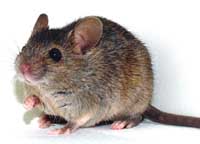Strain Data Sheet
RBRC00657
Strain Information | |
|---|---|
| Image |  |
| BRC No. | RBRC00657 |
| Type | Wild-derived Inbred |
| Species | Mus musculus castaneus |
| Strain name | HMI/Ms |
| Former Common name | |
| H-2 Haplotype | |
| ES Cell line | |
| Background strain | HMI [Mus musculus castaneus] |
| Appearance | agouti [A/A B/B C/C] |
| Strain development | The HMI/Ms strain was derived from Mus musculus castaneus mice trapped in Hemei, Taiwan in June 1986 and maintained by Dr. Kazuo Moriwaki, National Institute of Genetics. |
| Strain description | The HMI inbred strain was derived from Mus musculus castaneus mice trapped in Hemei, Taiwan in June 1986 and maintained by National Institute of Genetics. Mice were deposited to the RIKEN Tsukuba Institute in 1997 from Dr. Toshihiko Shiroishi. This strain is useful for genetic research, especially evolution and systematics. |
| Colony maintenance | Sibling Mating |
| References | |
Health Report | |
|---|---|
| Examination Date / Room / Rack | 2024/05/27Room:4-CRack:G 2024/02/26Room:4-CRack:G 2023/11/27Room:4-CRack:G 2023/08/28Room:4-CRack:G 2023/05/29Room:4-CRack:G 2023/02/27Room:4-CRack:G 2022/11/29Room:4-CRack:G 2022/08/29Room:4-CRack:G |
Gene | |
|---|---|
| Gene info | |
Ordering Information | |
|---|---|
| Donor DNA | |
| Research application | Cancer Research |
| Specific Term and Conditions | In publishing the research results obtained by use of the BIOLOGICAL RESOURCE, a citation of the following literature(s) designated by the DEPOSITOR is requested. In publishing the research results to be obtained by use of the BIOLOGICAL RESOURCE, an acknowledgment to the DEPOSITOR is requested. The RECIPIENT must contact the DEPOSITOR in the case of application for any patents or commercial use based on the results from the use of the BIOLOGICAL RESOURCE. Prior to requesting the BIOLOGICAL RESOURCE, the RECIPIENT must obtain approval from the DEPOSITOR using the Approval Form. (Contact info: Tsuyoshi Koide, Ph.D. <tkoide@nig.ac.jp>, Mouse Genomics Resource Laboratory) |
| Depositor | Toshihiko Shiroishi (National Institute of Genetics) |
| Strain Status |  Live mice Live mice Frozen embryos Frozen embryos Frozen sperm Frozen sperm |
| Strain Availability | Cryopreserved sperm (within 1 month) Cryopreserved embryos (within 1 month) Live mouse (3 to 6 months) |
| Additional Info. | Necessary documents for ordering:
Click Here for Mouse genomic DNA (RIKEN DNA Bank) |
BRC mice in Publications |
|---|
Saito A, Tahara R, Hirose M, Kadota M, Hasegawa A, Kondo S, Kato H, Amano T, Yoshiki A, Ogura A, Kiyosawa H. Inter-subspecies mouse F1 hybrid embryonic stem cell lines newly established for studies of allelic imbalance in gene expression. Exp Anim (2024) 38447983 Nürnberger C, Zimmermann V, Gerhardt M, Staeheli P. Influenza Virus Susceptibility of Wild-Derived CAST/EiJ Mice Results from Two Amino Acid Changes in the MX1 Restriction Factor. J Virol 90(23) 10682-10692(2016) 27654285 Bamunusinghe D, Liu Q, Lu X, Oler A, Kozak CA. Endogenous gammaretrovirus acquisition in Mus musculus subspecies carrying functional variants of the XPR1 virus receptor. J Virol 87(17) 9845-55(2013) 23824809 Shinmen A, Honda A, Ohkawa M, Hirose M, Ogonuki N, Yuzuriha M, Miki H, Mochida K, Inoue K, Abe K, Ito M, Ogura A. Efficient production of intersubspecific hybrid mice and embryonic stem cells by intracytoplasmic sperm injection. Mol Reprod Dev 74(9) 1081-8(2007) 17290420 Mochida K, Hasegawa A, Otaka N, Hama D, Furuya T, Yamaguchi M, Ichikawa E, Ijuin M, Taguma K, Hashimoto M, Takashima R, Kadota M, Hiraiwa N, Mekada K, Yoshiki A, Ogura A. Devising assisted reproductive technologies for wild-derived strains of mice: 37 strains from five subspecies of Mus musculus. PLoS One 9(12) e114305(2014) 25470728 Wakisaka N, Inoue K, Ogonuki N, Miki H, Sekita Y, Hanaki K, Akatsuka A, Kaneko-Ishino T, Ishino F, Ogura A. Ultrastructure of placental hyperplasia in mice: comparison of placental phenotypes with three different etiologies. Placenta 29(8) 753-9(2008) 18602690 |